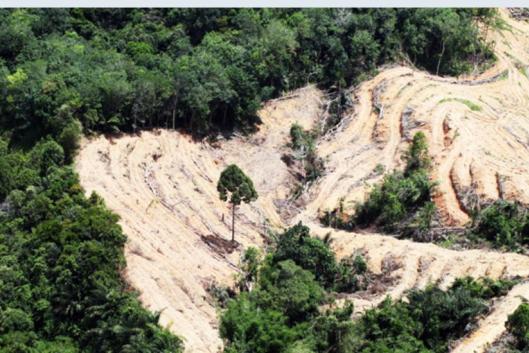Barbara Zimmerman with the International Conservation Fund for Canada and Cyril Kormos, Vice President for policy with the WILD Foundation are the authors of a new study in Bioscience which argues that the ecology of tropical hardwoods makes logging with truly sustainable practices not only impractical, but completely unprofitable.
Jeremy Hance interviewed the researches for mongabay.com: "Despite decades of trying to log sustainably, the rate of deforestation has barely dipped over the last 20 years, from 15 million hectares per year to 13 million hectares per year—and these are low estimates. Industrial logging has shown no capacity to keep forests standing. On the contrary, logging is usually the first step towards total clearing to make way for agricultural use," said the researchers.
The study found that just three rounds of logging in tropical forests resulted in the near-extinction of target trees in all major rainforest zones—South and Central America, Central Africa, and Southeast Asia—resulting not only in ecological disturbance but economic fallout.
The rich biodiversity, unparalleled variety, and hugely complex interconnections between species of tropical rainforests make them particularly susceptible to disturbance. Targeting only a few key tree species in the forest, loggers quickly plunder these species while leaving the rest standing, rapidly changing the overall structure of the ecosystem.
"Virtually all currently high-value timber species, are exceptionally long lived and slow growing, occur at low adult density, undergo high rates of seed and seedling mortality, sustain very sparse regeneration at the stand level, and rely on animal diversity for reproduction, all of which point to the conclusion that tropical trees probably need very large continuous areas of ecologically intact forest if they are to maintain viable population sizes," Zimmerman and Kormos write in their paper.
Most logging companies simply enter a primary forest, cut all high-value species, and then leave it to colonizers or raze everything for cattle pasture or monoculture plantations (such as pulp and paper, rubber, or palm oil). Logging companies generally cut-and-run, moving from one untouched tropical forest to the next, always looking for the short-term gain. For example, after logging out most of the forests in Borneo, loggers moved into places like Sumatra. Now that Sumatra has been devastated—with many of its forests turned into monoculture plantations—industrial logging went to New Guinea and the Solomon Islands. Primary rainforest is vanishing worldwide.
"Logging in the tropics follows the same economic model as is evident in most of the world’s ocean fisheries," Zimmerman and Kormos write. "The most-valuable species are selectively harvested first, and when they are depleted, the next-most-valuable set is taken, until the forests are mined completely of their timber."
Some scientists have argued that the solution to this problem is to inject “sustainable forest management” practices into logging companies in the tropics. According to these sustainability proponents, this would ensure harvests over the long-term while protecting overall forest health.
But according to their paper, even so-called reduced-impact logging—which is currently the exception rather than the norm in the tropics—considerably changes a forest's ecology. With many of the forest's vital seed and crop trees cut, Kormos and Zimmerman point out that "low-impact" logging leaves 20-50 percent of the canopy open, when "even small openings in the canopy (5-10 percent) can have significant impacts on the moisture content in the forest and increase risk of fire." Debris left on the forest floor quickly dries out, creating perfect fodder for fire. Unlike temperate forests, fires in primary rainforests are almost unheard of, but low-impact logging creates a new set of ecological conditions that leave the forest vulnerable to heat, wind, and, yes, fire.
Still, Zimmerman and Kormos, say logging can occur in tropical forests, only it should be small operations run by local communities, and not the industrial logging that dominates the trade today.
"Community logging works when it is implemented at non-industrial scales by communities that have a vested interest in being good stewards of their land," they say. The key here is that local communities govern their own forests, which takes away the cut-and-run problem.
Summary of the article “Experts: sustainable logging in rainforests impossible”, Jeremy Hance, mongabay.com, published at http://news.mongabay.com/2012/0718-hance-sustainable-logging.html
